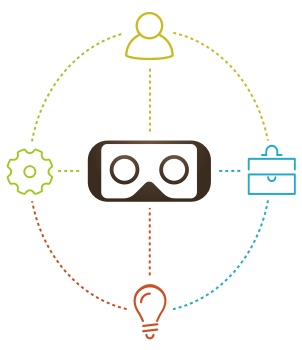
Shooting at the Polynesian Cultural Center.
We recently had the opportunity to sit down with Jon Farrell, Co-Founder and Chief Technology Officer of Villusion Studios to learn a little more about his background and get some of his industry thoughts and insights. Jon just returned from a 12 day work trip to Hawaii when we spoke with him. Now, before you get too envious I should say that he told us he was working literally the WHOLE time. Jon and the Villusion team were working on a Stereoscopic 360 degree video shoot for the Polynesian Cultural Center on Oahu's North Shore.

Jon Farrell
Villusion Studios, which he founded with his business partner Barry Zundel in 2014 is currently focused on meeting the large demand for 360 degree VR video applications. They offer a full suite of services for wherever their clients are at in the production process. They’re able to take a client's idea from conceptualization to creation, delivering interactive mobile and high end VR showcase applications. Jon is an FAA certified drone pilot, allowing Villusion to capture 360 aerial photography. He also handles a large portion of the previsualization, script writing, video capture, stitching, and editing tasks of the production process. Villusion is also able to help their clients outside of 360 video with expertise in VR games, story experiences, and previsualization. Prior to founding Villusion, Jon spent almost seven years at Dreamworks with a stint at Pixar Animation Studios in California. So let’s dive right into what Jon had to say:
Why are you passionate about VR?
I'm not passionate about VR so much as I'm passionate about better ways to communicate and tell stories. For me VR is a tool that enables communication on a level that is not possible in any other way. The feeling of presence that VR provides is unique to the medium and enables experiences that are exceptionally visceral in their impact. A VR experience engages more of the senses than perhaps any other medium to date, thereby allowing a suspension of disbelief that is unparalleled in other medium.
What has been an important factor in gaining traction in this space?
Gaining traction in the VR industry is very much about being first, but it is also about creating an MVP that is ready for mass consumption. Just as Netflix destroyed the video rental market because of convenience and accessibility, so will the VR companies that cater to the masses find themselves poised to lead the industry.
What do you think are the biggest challenges for businesses in this space?
The greatest challenges of the VR industry right now are related to timing and mass adoption. Many VR companies are finding that they have started too early...consumers are not yet consuming (VR) at a sustainable level. Until VR gets a major foothold either as a tool within industry or a major consumer driven market, companies will struggle to sell it. Hardware is currently not up to par either. We can shoot 4-8k video...but headsets cannot play it. There are too many limitations currently both with the hardware itself (and its cost) to allow it to become mainstream.
What do you think are the greatest opportunities within the VR/AR space?
The greatest opportunities in the VR/AR space are those that enable better and faster communication in a more natural environment. The barrier between humans and computing has always been the screen. VR proposes to shatter the way we have always worked, and replace it with something more intuitive. Tools that remove barriers and allow us to express our ideas in a more fluid way will create advancements in industry that could come about by no other means. These are the opportunities VR and AR open. They allow us to work faster, safer, smarter, and present realities to our eyes that are available in no other way. This is a key point in VR content creation. The most successful content will not be available in any other medium.
Where do you hope we’ll be in 10 years with VR/AR?
I would hope that in 10 years VR has hit the mainstream. My personal projections for VR mass adoption are extremely conservative and I would not be surprised if it were a 5 to 10 year process. AR on the other hand will grow much more quickly. Within the next few years I would hope that most advertising has hidden AR content and that a vast world of mobile VR exploration has opened up.
We are very fortunate to have Jon as a Founding Member of the IVRC! If you’d like to connect with him reach out to him on LinkedIn.


Recent Comments